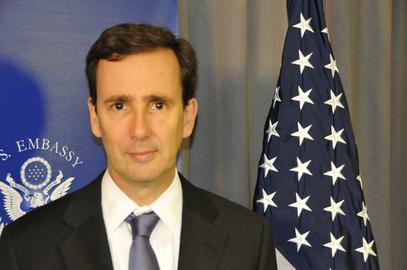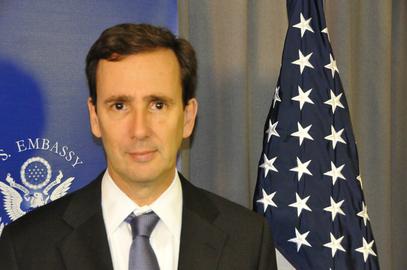
Alan Eyre, the US State Department’s Persian-language spokesperson and a key player in yesterday’s nuclear deal between Iran and the P5+1 countries, enjoys near celebrity status in Iran. Known for his love of Iranian culture and literature, Eyre will now also be credited with helping to bring about the historic nuclear deal signed in Vienna. Once approved by all relevant parties including Iranian officials, the agreement will reverse international sanctions against Iran and open up a country that has been isolated from the outside world for many years.
IranWire spoke to Mr Eyre about the deal, the likelihood that US Congress will reject it, and how it might affect US-Iranian relations and the human rights situation in Iran.
During his speech yesterday, President Obama said that he would veto any attempts by Congress to block the deal’s implementation. Does that mean that the agreement is a done deal?
In one way, the deal is final and definite. No matter what happens next, the contents of the agreement will not change. However, Congress could turn the tables around. It appears that President Obama doesn’t have enough power to implement his veto if he is forced to do so by Congress. Don’t forget, though, that the same process needs to happen in Iran, and that the deal also needs the approval of the Security Council.
Some people in Iran say that certain items in the agreement are ambiguous and that the governments of all involved parties will review the text in the next 15 days. Does this mean that there are parts of the deal that still need amending?
The published text is final and there are no aspects of it that need changing. All the P5+1 countries’ governments, as well as the Iranian government, can review the text according to their own laws and regulations, but as far as the text is concerned, the content and its appendices are final.
In a few days, there will be a UN Security Council resolution on the deal. Will this come out before the US Congress makes its decision?
Yes, the UN resolution will be announced before the Congress vote.
Former president and influential figure Akbar Hashemi Rafsanjani discussed the possibility of reopening the US embassy in Iran and President Obama said that the deal could change US-Iranian relations. What do you foresee for Iran and America now?
There is no plan to reopen the US embassy in Tehran and the deal doesn’t necessarily mean that the relationship between our two countries will change any time soon. But it does mean that problems and serious issues can be resolved through dynamic interaction and diplomacy. Our severe differences with Iran still remain, but God willing, we’ll use cooperation, rather than confrontation, to resolve them.
Iran still has a dire human rights situation. What do you plan to do now with regards to human rights issues, such as the detention of Iranian-Americans in Iran?
Our approach towards human rights issues in Iran hasn’t changed. Just because we’ve reached a deal it doesn’t mean that we will start to ignore human rights violations in the country. Our efforts continue to concentrate on improving the human rights situation in Iran and we’ll never stop trying to free detained American citizens, just like we continue to request Iran’s support in finding and returning Bob Levinson to his family.
Related Articles:
"No miracles but signs of real hope"
To read more stories like this, sign up to our weekly email.
visit the accountability section
In this section of Iran Wire, you can contact the officials and launch your campaign for various problems

























comments